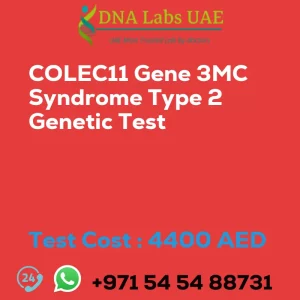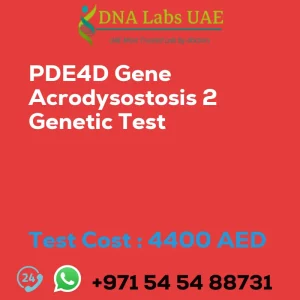GJB4 Gene Erythrokeratodermia variabilis et progressive Genetic Test
At DNA Labs UAE, we offer the GJB4 Gene Erythrokeratodermia variabilis et progressive Genetic Test for individuals who suspect they may have this rare genetic disorder. Erythrokeratodermia variabilis et progressive (EKVP) is a type of ichthyosis, a group of skin disorders characterized by dry, scaly skin.
Test Details
The GJB4 gene is associated with EKVP. This genetic disorder is inherited in an autosomal dominant manner, meaning that an individual only needs to inherit one copy of the mutated GJB4 gene from one parent to develop the condition. Mutations in the GJB4 gene disrupt the normal functioning of connexin 30.3, a protein that forms channels in the skin cells. These channels are responsible for the exchange of molecules and ions between cells, which is crucial for the normal development and maintenance of the skin.
Our GJB4 Gene Erythrokeratodermia variabilis et progressive Genetic Test utilizes NGS (Next-Generation Sequencing) technology to analyze multiple genes simultaneously and identify mutations or variations that may be associated with EKVP. By identifying mutations in the GJB4 gene, this test can confirm a diagnosis of EKVP and provide information about the specific genetic mutation causing the condition.
Test Components and Price
The GJB4 Gene Erythrokeratodermia variabilis et progressive Genetic Test is priced at 4400.0 AED. The test requires a sample of either blood, extracted DNA, or one drop of blood on an FTA card.
Report Delivery and Test Type
After the sample is received, the report will be delivered within 3 to 4 weeks. The test falls under the Osteology Dermatology Immunology Disorders category and is conducted by our team of Genetics specialists.
Pre Test Information
Prior to the test, it is important to provide the clinical history of the patient who is going for the GJB4 Gene Erythrokeratodermia variabilis et progressive NGS Genetic DNA Test. Additionally, a Genetic Counselling session will be conducted to draw a pedigree chart of family members affected with the GJB4 Gene Erythrokeratodermia variabilis et progressive NGS Genetic DNA Test gene GJB4.
Benefits of Genetic Testing for EKVP
Genetic testing for EKVP can be beneficial for individuals who have symptoms consistent with the condition, as well as for family members who may be at risk of inheriting the mutation. It can aid in early diagnosis, genetic counseling, and family planning decisions. However, it is important to note that genetic testing is not always necessary for diagnosis, as clinical evaluation and examination of the skin lesions can often be sufficient. Therefore, it is recommended to undergo genetic testing under the guidance of a healthcare professional with expertise in genetic disorders.
| Test Name | GJB4 Gene Erythrokeratodermia variabilis et progressive Genetic Test |
|---|---|
| Components | |
| Price | 4400.0 AED |
| Sample Condition | Blood or Extracted DNA or One drop Blood on FTA Card |
| Report Delivery | 3 to 4 Weeks |
| Method | NGS Technology |
| Test type | Osteology Dermatology Immunology Disorders |
| Doctor | Dermatologist |
| Test Department: | Genetics |
| Pre Test Information | Clinical History of Patient who is going for GJB4 Gene Erythrokeratodermia variabilis et progressive NGS Genetic DNA Test. A Genetic Counselling session to draw a pedigree chart of family members affected with GJB4 Gene Erythrokeratodermia variabilis et progressive NGS Genetic DNA Test gene GJB4 |
| Test Details |
The GJB4 gene is associated with a rare genetic disorder called Erythrokeratodermia variabilis et progressive (EKVP). EKVP is a type of ichthyosis, which is a group of skin disorders characterized by dry, scaly skin. EKVP is inherited in an autosomal dominant manner, meaning that an individual only needs to inherit one copy of the mutated GJB4 gene from one parent to develop the condition. Mutations in the GJB4 gene disrupt the normal functioning of connexin 30.3, a protein that forms channels in the skin cells. These channels allow for the exchange of molecules and ions between cells, which is important for the normal development and maintenance of the skin. NGS (Next-Generation Sequencing) genetic testing is a method used to analyze multiple genes simultaneously to identify mutations or variations that may be associated with a particular condition. In the case of EKVP, NGS genetic testing can be used to identify mutations in the GJB4 gene. This can help confirm a diagnosis of EKVP and provide information about the specific genetic mutation that is causing the condition. Genetic testing for EKVP can be useful for individuals who have symptoms consistent with the condition, as well as for family members of affected individuals who may be at risk of inheriting the mutation. It can help with early diagnosis, genetic counseling, and family planning decisions. However, it is important to note that genetic testing is not always necessary for diagnosis, as clinical evaluation and examination of the skin lesions can often be sufficient. Genetic testing should be done under the guidance of a healthcare professional with expertise in genetic disorders. |








